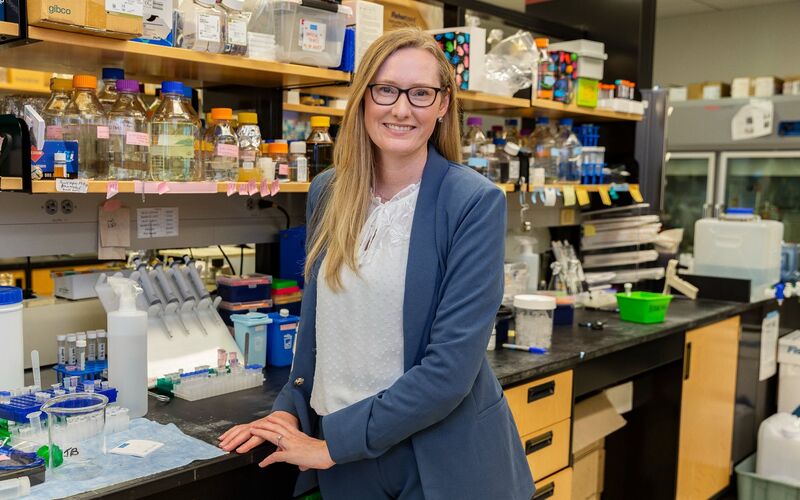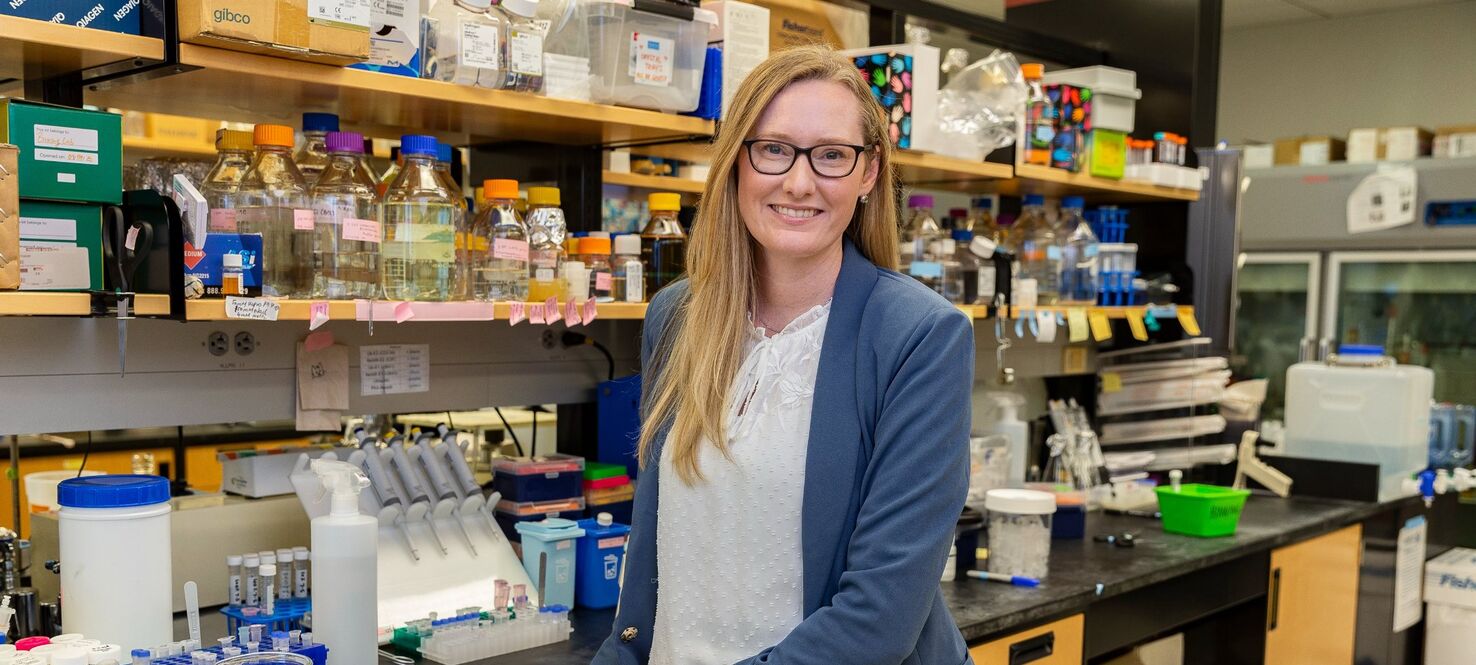Third-Grade Love of Math Sparked Career in Cancer Biology
SPECIAL SERIES: WOMEN IN ONCOLOGY
Women faculty at Moffitt Cancer Center come from different backgrounds around the globe. Their areas of research and clinical care span the entire cancer continuum, including clinical science and trials, basic science, epidemiology, health outcomes, medical physics and more. Community involvement and mentorship among faculty are foundational, and we celebrate the essential roles women play in making a difference at the cancer center and in society.
Meet Dr. Jennifer Binning
Jennifer Binning, PhD, is an assistant member of Moffitt Cancer Center’s Cancer Biology and Evolution Program and a professor in the Department of Oncologic Sciences at the University of South Florida College of Medicine. Binning’s research focuses on how rewiring host ubiquitin processes drives tumorigenesis and how these processes can be manipulated to develop new therapeutics. She earned a biochemistry degree from Iowa State University in 2014 and completed her postdoctoral fellowship at the University of California San Francisco in 2018. Binning leads a research team in the Molecular Oncology Department and serves as co-director of the Chemical Biology Core and recruitment director for the Cancer Biology PhD Program.
What initially sparked your interest in science?
My passion for science began early, around third grade, when I discovered a love for math through algebra, but it truly blossomed in high school. Despite attending a small rural school, I was fortunate to have seven years of hands-on science classes in biology, chemistry and physics, many of which were upper-level. The hands-on experiments, like creating solutions and working with unknowns, fueled my curiosity and love for problem-solving. I’ve always loved solving puzzles, and that’s where my passion for science really stems from. The classes were set up in a way that constantly challenged me to piece things together and figure out how everything worked. That kind of learning environment sparked my love for science.
What made you go into oncology specifically?
My interest in oncology developed through my research in viral-related studies, particularly focusing on HIV. As I progressed in my training, I noticed a significant overlap between viral mechanisms and cancer biology, especially in how viral proteins can rewire cellular circuits, which is also seen in HPV. This intersection of molecular questions in virology and cancer allowed me to bring my expertise together in a meaningful way. Working at Moffitt has given me the opportunity to apply this knowledge to cancer research.
What are you working on right now that you are most excited about?
I’m particularly excited about a project where we’re developing novel drugs to target HPV-related cancers. This effort involves a large team at Moffitt, bringing together scientists from different disciplines, which highlights the incredible collaborative environment here. The focus of this project is on understanding how protein post-translational modifications are altered in disease states and whether we can manipulate these modifications to create therapeutic treatments. A big part of what makes this research exciting is the connection to viral mechanisms, especially in how viruses like HPV can naturally modify proteins to drive cancer. We’re studying how oncogenic viruses achieve this, and we’re trying to apply that knowledge to develop drugs that perform similar functions to combat cancer. By learning how viruses rewire cellular processes, we hope to create treatments that could change how we approach certain types of cancer, making it a potentially transformative project.
What’s the biggest challenge you’ve had to face and how did you overcome it?
The biggest challenge I’ve faced is also one of the things I love most about this job — having to wear many different hats. As a scientist, I need to not only think deeply about the research questions I want to explore and how to approach them but also figure out how to fund and support the work. As a principal investigator, I spend less time at the bench and more time mentoring others, which adds another layer of responsibility. Juggling these different aspects — research, funding and mentorship — can be challenging, but it’s also what makes the work so rewarding and intellectually stimulating.
What’s the best piece of advice you received in your career?
“Use your no to protect your yes.” This advice resonated with me as I took on more responsibilities. Often, junior faculty or those new to their roles feel pressured to say yes to everything, leading to burnout. By learning to say no, I could reserve my energy for the projects and opportunities I truly care about. It’s a valuable framework for managing time and commitments, ensuring that when something meaningful comes along, I have the capacity to embrace it. I found this advice to be beneficial for anyone feeling overwhelmed by their obligations.
How can we get the next generation excited about pursuing a career in oncology?
To ignite passion for careers in oncology among the next generation, we don’t necessarily need to spark their initial excitement. They already arrive with a strong enthusiasm for the field. Instead, our focus should be on providing robust support and resources to ensure a clear pathway for them to continue their journey in oncology research. The incoming trainees are incredibly passionate from day one, so it’s essential to nurture that enthusiasm and create an environment where the best and brightest can thrive.
Can you share one patient story that has really impacted you?
One of the most memorable patient stories that has profoundly affected me was shared during a presentation at one of our larger faculty meetings, organized as part of the Patient Researcher Forum. The patient, who had battled cancer multiple times, spoke passionately about her journey. She credited her current health to the innovative clinical trials made possible by advancements in basic science. Her heartfelt message emphasized that it wasn’t just the exceptional care from her doctors and support staff that saved her. It was the cutting-edge drugs and therapies emerging from research labs that truly made a difference.
If you hadn’t become a doctor, what would you be?
If I hadn’t pursued a career in medicine, I would have become a teacher. I have a genuine passion for being there for younger generations and facilitating their learning experiences. I thrive on personal interaction and enjoy the dynamic nature of teaching, where each day brings new challenges and opportunities for growth. The troubleshooting aspect of education excites me, allowing for continuous learning and adaptability. While I don’t foresee stepping into a full-time high school teaching role, I find myself gravitating toward educational initiatives at Moffitt.




